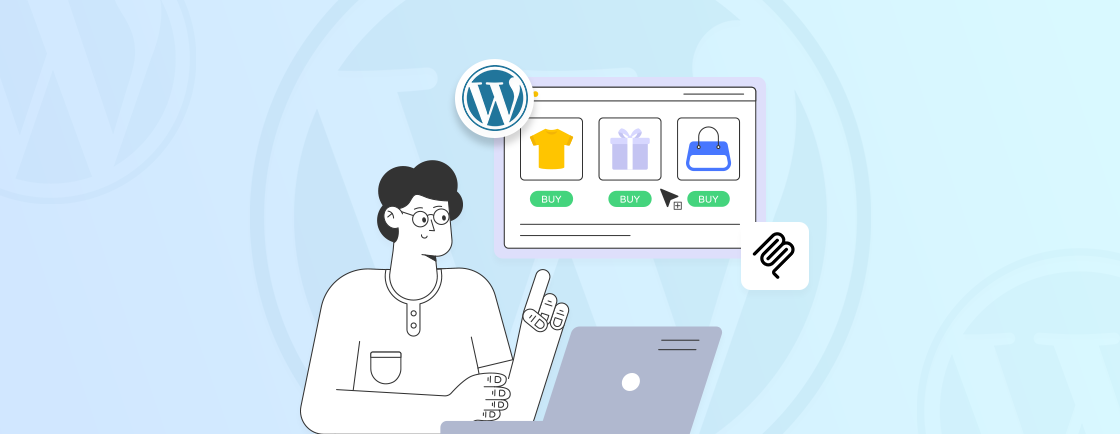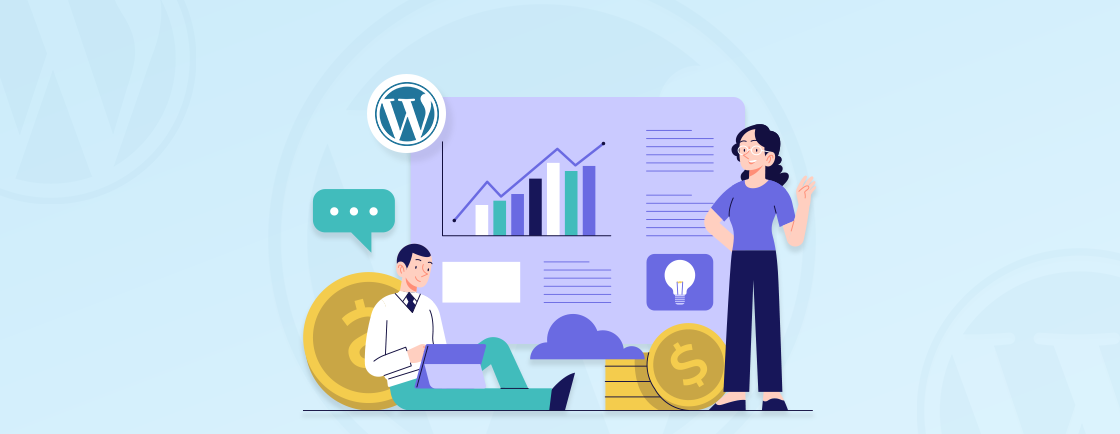Table of Contents
A personal website is more than just a digital space; it’s your opportunity to showcase your unique identity, talents, and expertise to the world. Whether you’re a freelancer, entrepreneur, or creative professional, a WordPress-powered personal website offers a way to establish your online presence.
From customizable designs to powerful integrations, WordPress provides the tools you need to craft a platform that reflects your vision.
In this blog, we’ll explore how WordPress experts build a personal website that can help you amplify your online potential, connect with your audience, and stand out in a competitive digital environment. So, let’s start!
Benefits of a WordPress Personal Website
A WordPress personal website offers a multitude of advantages for individuals seeking to enhance their online presence.
Establish a Strong Online Identity
Your personal website serves as your digital resume and portfolio. It allows you to curate your online identity, showcasing your skills, experience, and personality in a professional and engaging manner.
By controlling the narrative, you can present yourself authentically and build a credible online brand that reflects your unique strengths and aspirations.
Advance Your Career
In a competitive market, a professional online presence is invaluable. Your website acts as a central hub for potential employers and clients to learn more about you and your work.
It provides a platform to showcase your projects, testimonials, and publications, demonstrating your expertise and professionalism.
A well-maintained website can significantly increase your visibility and attract exciting career opportunities.
Build a Powerful Network
Your website can become a valuable tool for networking and collaboration. By sharing your work and insights, you can connect with like-minded individuals, industry professionals, and potential collaborators.
You can also use your website to build a community around your interests, fostering meaningful connections and expanding your professional network.
Explore New Opportunities
A personal website can open doors to exciting new opportunities. It can serve as a platform for monetizing your skills, such as offering freelance services, selling digital products, or building an audience for your blog or other creative endeavors.
By leveraging the power of your online presence, you can explore new avenues for personal and professional growth.
These are just a few of the many benefits of creating a WordPress personal website. By investing time and effort in building a strong online presence, you can unlock your full potential and achieve your career goals.
How to Build Your WordPress Personal Website?
Building a WordPress personal website is a relatively straightforward process, even for those with limited technical experience. Here’s a step-by-step guide to help you create a website that truly reflects your personal brand:
1. Choose the Right Hosting Provider
Selecting a reliable hosting provider is crucial for your website’s performance, security, and overall success. Keep the following factors in mind:
- Uptime and Speed: A hosting provider with 99.9% uptime and fast loading speeds ensures your website remains accessible and delivers a positive user experience.
- Customer Support: Opt for providers offering 24/7 support via multiple channels such as live chat, phone, and email.
- Scalability: As your website grows, your hosting plan should allow seamless upgrades to handle increased traffic.
- Additional Features: Look for features like free SSL certificates, automatic backups, and staging environments for testing changes.
Some popular and reliable hosting providers include Hostinger, Pantheon.io, and FlyWheel, which cater specifically to WordPress websites.
2. Select a WordPress Theme
Your WordPress theme sets the tone for your website’s visual appeal and user experience. While selecting a theme:
- Reflect Your Personal Brand: Choose a theme that aligns with your style and the message you want to convey, whether professional, creative, or minimalist.
- Responsiveness: Ensure the theme is mobile-friendly to cater to visitors on different devices.
- Customization Options: Look for themes that offer customization through drag-and-drop builders like Elementor or WPBakery.
- Lightweight Design: A lightweight theme improves loading speed, which benefits both user experience and SEO.
Explore options in the WordPress theme directory, or check out premium marketplaces like ThemeForest and Elegant Themes for more robust solutions.
3. Install Essential Plugins
Plugins expand the functionality of your website and provide essential tools. Here are some must-have plugins for personal websites:
- Yoast SEO: Helps optimize your content for search engines, offering insights on keyword usage, meta descriptions, and readability.
- Contact Form 7: Create simple yet customizable forms for visitors to get in touch with you.
- WP Super Cache: Boost your website’s speed by caching pages for faster load times.
- Akismet Anti-Spam: Protects your website from spam comments and keeps discussions clean.
- UpdraftPlus: Back up your website to ensure data is safe and easily recoverable in case of any issues.
Install and configure these plugins to improve your website’s functionality and user experience.
4. Create High-Quality Content
Compelling content is the backbone of any successful personal website. Focus on the following types of content:
- Engaging Blog Posts: Share insights, expertise, and personal stories to connect with your audience.
- Portfolio Showcase: Highlight your achievements, projects, and skills with a professional and visually appealing portfolio section.
- About Me Page: Tell your story in a relatable way, including your background, skills, and what drives your passion.
- Testimonials and Reviews: Showcase social proof from clients, employers, or colleagues to build trust and credibility.
Regularly update your website with fresh and relevant content to keep visitors engaged and encourage repeat visits.
How to Optimize a WordPress Website for SEO?
Search Engine Optimization (SEO) plays a vital role in improving your website’s visibility and attracting organic traffic. Follow these strategies to optimize your WordPress website effectively:
1. Conduct Keyword Research
Keywords are the foundation of any successful SEO strategy. To find relevant keywords:
- Use tools like Google Keyword Planner, Ahrefs, or SEMrush to identify high-volume, low-competition keywords.
- Focus on long-tail keywords to target specific user queries and improve your chances of ranking.
- Align keywords with the content’s purpose, ensuring relevance and value for your target audience.
2. Optimize On-Page SEO
On-page optimization ensures that your content is search engine-friendly. Key areas to focus on include:
- Keyword Placement: Incorporate keywords naturally in titles, headings, meta descriptions, and throughout your content.
- Internal Linking: Link to other pages on your website to improve navigation and spread link equity.
- Image Optimization: Compress image files using tools like TinyPNG and add descriptive filenames and alt text.
- Mobile Optimization: Use Google’s Mobile-Friendly Test to ensure your website works seamlessly on all devices.
- Schema Markup: Implement schema.org structured data to enhance how search engines understand your content.
3. Build High-Quality Backlinks
Backlinks signal to search engines that your website is trustworthy and authoritative. Build quality backlinks by:
- Guest Blogging: Write articles for reputable websites in your niche and include links to your site.
- Content Promotion: Share your content on social media platforms and forums to reach a wider audience.
- Networking: Build relationships with influencers, bloggers, and website owners to earn organic backlinks.
4. Enhance Website Speed
Page speed directly impacts user experience and SEO rankings. To improve speed:
- Use a Content Delivery Network (CDN) to distribute content across servers and reduce latency.
- Minimize CSS, JavaScript, and HTML using plugins like Autoptimize.
- Install a caching plugin like WP Super Cache to serve cached versions of your pages.
5. Monitor and Analyze Results
Track your website’s SEO performance regularly using:
- Google Analytics: Analyze traffic sources, user behavior, and popular pages to refine your strategy.
- Google Search Console: Identify issues like broken links, indexing errors, and keyword performance.
- SEO Plugins: Use tools like Yoast SEO to receive insights and suggestions for improvement.
Regular analysis helps you identify what’s working and where adjustments are needed, ensuring consistent growth over time.
Conclusion
Building a website requires ongoing effort. Regularly update your content, monitor your website’s performance, and adapt your strategies based on your audience and the evolving digital landscape.
Remember, your website is a dynamic platform for growth and self-expression. Embrace the opportunity to share your story with the world and unlock your full online potential.
If you need professional help with WordPress development, contact us today, and our WordPress developers will ensure the best outcomes for your website!
FAQs on WordPress Personal Website
Is WordPress good for a personal website?
Yes, WordPress is an excellent choice for a personal website. It offers flexibility, customization options, and thousands of themes and plugins to create a site that perfectly reflects your personality or brand.
Is it hard to maintain a WordPress website?
Not at all. WordPress maintenance involves regular updates, backups, and occasional plugin checks. Many hosting providers and plugins also simplify this process, making it beginner-friendly.
Which is better, Wix or WordPress?
WordPress is better for flexibility, scalability, and customization, while Wix is ideal for those seeking an easy drag-and-drop builder with limited customization needs. The choice depends on your goals and technical expertise.
Create with WordPress CMS
Build flexible and scalable websites using WordPress's powerful content management system.





